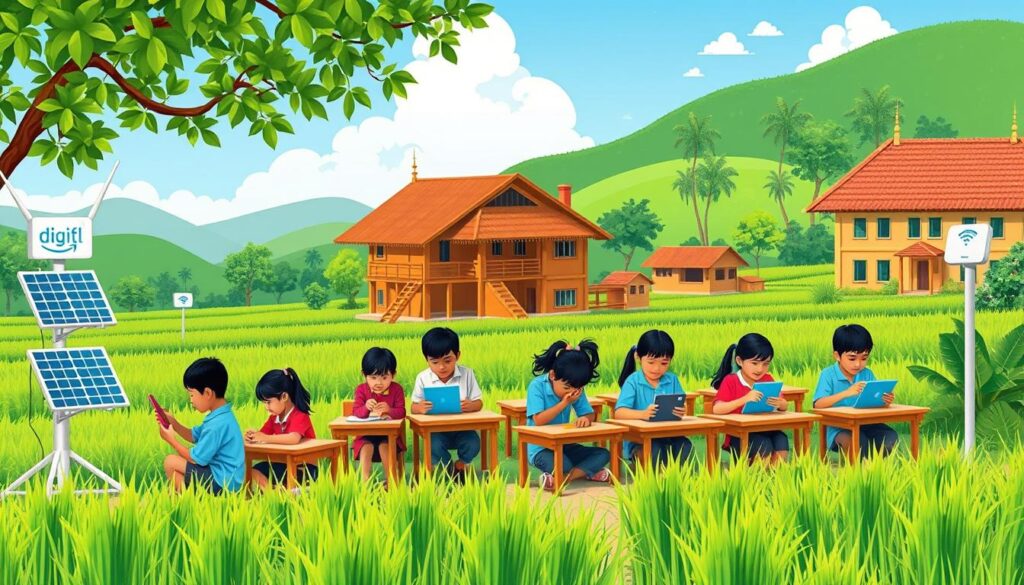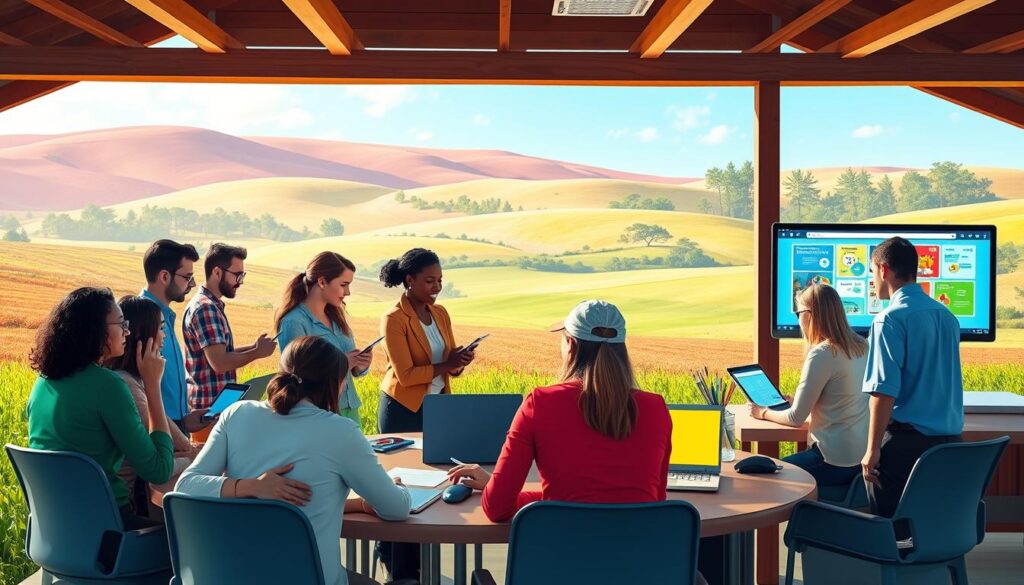In today’s digital world, teaching students basic digital skills early on is key. This is especially true for rural areas in South Africa. Here, closing the digital gap and getting students ready for a tech-filled future is a big challenge. We ask: How can we make sure every child, no matter where they live, gets the digital tools and knowledge they need to succeed in the 21st century?
By starting digital literacy programs in rural schools, we can help students feel confident online. This can spark creativity and open doors to new opportunities. Through teamwork and creative solutions, we can close the digital gap. This will help rural education in South Africa reach its full potential.
Key Takeaways
- Introducing digital literacy from the earliest stages of education is crucial for preparing rural students for a technology-driven future.
- Bridging the digital divide in rural communities requires a multifaceted approach, addressing infrastructure challenges and socioeconomic factors.
- Equipping rural students with essential digital skills, such as computer literacy, internet safety, and online research, can open new doors of opportunity.
- Implementing EdTech solutions in resource-limited settings demands creative thinking and community-driven initiatives.
- Investing in digital infrastructure, teacher training, and innovative learning platforms can transform the landscape of rural education in South Africa.
Understanding the Digital Divide in Rural South African Schools
In rural South Africa, the digital divide is a big problem. It stops students from getting the technology and digital skills they need. We need to know why this is happening and how to fix it.
Current Technology Access Statistics
Only 22% of rural schools in South Africa have good internet, compared to 87% in cities. This big difference shows how hard it is for rural schools to get digital tools.
Infrastructure Challenges
Rural schools face big problems like no stable electricity and old computers. Schools in remote areas often have no power and outdated tech. This makes it hard to use digital tools in class.
Socioeconomic Factors
Poverty and lack of technology at home also affect rural students. These factors make it harder for them to learn digital skills compared to city kids.
| Indicator | Urban Schools | Rural Schools |
|---|---|---|
| Internet Access | 87% | 22% |
| Reliable Electricity | 92% | 68% |
| Computer Hardware | 79% | 41% |
The table shows how different urban and rural schools are in getting digital tools. It shows we really need to work on the digital divide. We must make sure all students get a chance to learn about technology.
“Closing the digital divide in rural South Africa is not just about providing access to technology, but also empowering communities with the skills and resources to utilize it effectively.”
Digital Literacy from Day One: Preparing Rural Schools for the Future
We believe digital literacy should start from the first day of school. By adding digital literacy to rural South African schools, we create a future-ready learning space. This helps students gain the 21st century skills needed for today’s world.
Learning tech early boosts technical skills and also improves critical thinking and teamwork. These skills are key for success in today’s fast-changing job market. With a strong focus on digital literacy, students in remote areas can confidently explore the digital world.
We dream of a future where rural students are not just tech users but creators and innovators. By starting with digital literacy, we help them become the future-ready leaders our communities need.
“Preparing students for the future means equipping them with the digital skills they need to thrive in a rapidly evolving world.”
We’re working with partners and using EdTech to close the digital gap. We want to make sure every child, no matter where they live, can develop their 21st century skills. By focusing on digital literacy in rural schools, we’re building a brighter future for all.
Let’s work together to empower rural learners for the future. We aim to raise a generation of digital natives who can lead, innovate, and change their communities.
Essential Digital Skills for Rural Students
In today’s digital world, it’s key to teach rural students important digital skills. These skills are vital for their success in school and later careers. We’ll look at the basic abilities rural learners need to succeed in the 21st century.
Basic Computer Literacy
Knowing how to use a computer is the first step. Rural students should learn to use common software like word processors and spreadsheets. They also need to know how to surf the internet, send emails, and organize digital files.
Internet Safety and Digital Citizenship
Teaching students about internet safety and digital citizenship is very important. They should know how to spot and avoid online dangers. They also need to learn how to protect their personal info and use social media wisely. It’s important to teach them to behave ethically online.
Online Research and Information Evaluation
In today’s world, finding and evaluating online information is a critical skill. Students need to learn how to find trustworthy sources and judge the credibility of online content. They should also know how to use data to support their studies and work.
By teaching rural students these essential digital skills, we help them thrive in the digital world. They can explore new educational and career paths. And they become active members of the 21st century digital community.
Implementing EdTech Solutions in Resource-Limited Settings
Bringing educational technology (edtech) to rural schools with limited resources is tough. But, with creative solutions, we can help students learn digital skills. It’s important to find ways to close the digital equity gap. We need to figure out how to use edtech integration and classroom technology well.
First, we must make edtech work in rural areas. This might mean using mobile learning apps that don’t need constant internet. Or creating tools that work offline. By doing this, we make sure all students can use digital tools, no matter where they are.
Overcoming Infrastructure Challenges
In many rural South African schools, finding reliable electricity and fast internet is hard. To solve this, we can try new ideas like solar-powered labs, mobile charging stations, and internet centers in the community. Investing in green energy and internet can help us use edtech integration and teach digital skills.
| Solution | Benefits | Challenges |
|---|---|---|
| Solar-powered computer labs | Reliable power supply, reduced electricity costs | Initial investment, maintenance requirements |
| Mobile device charging stations | Accessible charging options, increased device usage | Securing and protecting charging stations |
| Community-based internet hubs | Shared connectivity, affordable access | Ensuring equitable distribution, ongoing funding |
By fixing the infrastructure and building a digital base, we can make edtech integration work. This way, we give rural students the digital equity they need.

Building Digital Infrastructure in Rural Communities
To bridge the digital divide in rural South Africa, we need a strong digital infrastructure. This includes new internet solutions, programs to give out hardware, and reliable support systems. These steps are key to making sure everyone has access to digital tools.
Internet Connectivity Solutions
Getting fast and affordable internet to rural schools is essential. We’re looking at satellite internet, community Wi-Fi, and mobile hotspots. These ideas help reach areas where traditional internet can’t go, supporting digital learning.
Hardware Distribution Programs
It’s important to get digital tools like laptops and tablets to rural students. Programs with tech companies and the government are helping with this. They aim to close the gap in technology between cities and countryside.
Maintenance and Support Systems
Keeping digital systems running well is crucial. We’re training local tech experts to help with this. This way, rural areas can handle their own tech needs, making learning with technology sustainable.
These efforts are making a big difference in rural areas. They’re helping to ensure that digital tools are available to all. This opens up new opportunities for rural learners and communities in South Africa.
Teacher Training and Professional Development
We are working hard to close the digital gap in rural South African schools. It’s crucial to give teachers the skills and knowledge they need. This way, they can use technology well in their teaching.
Our teacher training and professional development programs are key. They make sure teachers are not just tech-savvy but also know how to use digital tools to improve learning. By growing our teachers’ skills, we can make the most of technology education and digital skills development in rural areas.
Fostering Digital Literacy for Educators
Our teacher training focuses on building a solid base in digital literacy. Teachers get hands-on experience in workshops and interactive sessions. They learn essential skills like:
- Basic computer and software skills
- How to use the internet and find online resources
- Using digital tools in lesson planning and classroom management
- Teaching digital citizenship and online safety
Ongoing Professional Development
To keep our teachers up-to-date with future-ready learning, we offer ongoing training. This includes:
- Regular sessions on new educational technologies
- Workshops to share teaching ideas and strategies
- Mentorship programs for new and experienced teachers
- Online learning platforms and self-paced training
By empowering our teachers and encouraging ongoing learning, we’re helping rural schools get ready for the digital future.

| Training Focus | Key Outcomes |
|---|---|
| Digital Literacy | Proficiency in basic computer skills, online navigation, and digital tool integration |
| Pedagogical Integration | Effective lesson planning and classroom management with technology |
| Continuous Learning | Ongoing professional development and access to emerging educational technologies |
“By investing in the professional growth of our teaching force, we can unlock the full potential of technology education and digital skills development in rural communities.”
Innovative Online Learning Platforms for Rural Education
We aim to close the digital gap and offer top-notch education to rural schools in South Africa. We’ve found online learning platforms that meet the needs of these communities. These tools use technology to make learning fun and accessible for everyone.
Mobile Learning Solutions
We know many rural areas don’t have many computers. So, we focused on online platforms that work on phones and tablets. These platforms have cool features like interactive lessons, games, and videos. They make learning easy and fun, no matter where you are.
Offline Learning Capabilities
Internet can be spotty in rural areas. That’s why we picked online platforms that work offline. Students can download lessons, videos, and exercises. This way, they can keep learning even without the internet.
Interactive Educational Tools
We want to teach digital literacy from the start. So, we chose online platforms with cool tools. There are virtual labs, augmented reality, and games that make learning fun and interactive.
By using these online platforms, we’re getting rural schools ready for the future. We’re giving students and teachers the digital skills they need to succeed today.
“Technology has the power to transform education, especially in underserved communities. By leveraging innovative online platforms, we can bring digital literacy and quality learning experiences to the doorsteps of rural South African students.”
Conclusion
We’ve looked at why digital literacy is key for rural South African schools. We’ve seen the digital divide, infrastructure and economic challenges. And we’ve talked about the digital skills students need today.
Using EdTech, building digital infrastructure, and training teachers are important steps. Online and mobile learning can give rural students the tools they need. This way, they can be ready for the future.
Digital literacy in rural education is crucial for a fair and prosperous future. By supporting these programs, every child can succeed in the digital world. This helps them grow and help their communities.
FAQ
What is the importance of digital literacy in rural education?
Teaching digital literacy early is key for rural students in South Africa. It prepares them for a digital future. It gives them skills to succeed in a world that’s more tech-driven.
What are the key challenges in bringing technology to rural schools?
Bringing tech to rural schools faces big hurdles. Limited internet and electricity are major issues. Also, money problems can make it hard to adopt new tech.
What are the essential digital skills that rural students need to develop?
Rural students need basic computer skills and to know how to stay safe online. They also need to learn how to find and check information online. These skills are vital for success in today’s digital world.
How can educational technology solutions be implemented in resource-limited rural settings?
In rural areas, we need creative ways to use tech. Mobile learning and tools that work without internet are good options. We must find ways to overcome infrastructure problems and ensure everyone has equal access to tech.
What role do teachers play in digital literacy initiatives for rural schools?
Teachers are vital for digital literacy in rural schools. They need training to use tech in their teaching. This helps create a learning environment ready for the future.
What are some examples of innovative online learning platforms for rural education?
South Africa has online learning platforms made for rural areas. They are easy to use on phones and work without internet. These platforms aim to give all students a chance to learn digitally.



